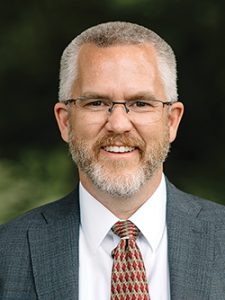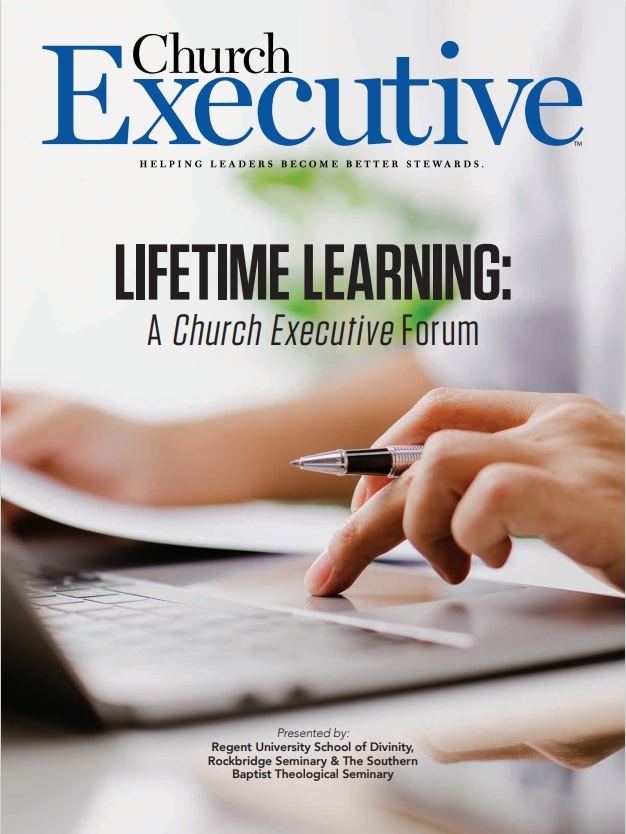
Self-leadership does not begin with oneself. Foundationally it begins with God. God is not simply a means to greater organizational ends. He is the ultimate end and true joy that will satisfy our deepest longings. He is the end, not merely the means to some other end.
One of the authors I turn to frequently is C. S. Lewis. In his book A Grief Observed, Lewis makes this point while commenting on our view of something even as good as reunions in the life to come. He writes:
[God] can’t be used as a road. If you’re approaching Him not as the goal, but as a road, not as the end but as the means, you’re not really approaching Him at all. That’s what was really wrong with all those popular pictures of happy reunions ‘on the further shore’; not the simple-minded and very earthly images, but the fact that they make an End of what we can get only as a by-product of the true End [—God].

Duke K. McCall Professor of Christian Leadership
Chair of the Department of Leadership and Discipleship
The Southern Baptist Theological Seminary
Lewis’ point here is vital. If we approach God simply as a means to our ends — even good ends, like being reunited with loved ones, pursuing a life of spiritual discipline and transformation, or working to establish healthy and thriving churches — we are not really approaching Him at all. When God is not our true end, He will not be our means either. In the words of Lewis, “God will not be used as a convenience.” But when God genuinely becomes our ultimate end, when He becomes our treasure and infinite delight, then He is ready and willing to graciously give us all things needed to do His will in life and leadership. Such logic resonates with St. Augustine’s beautiful prayer in his Confessions: “He loves thee too little who loves anything together with thee which he loves not for thy sake.”
In my leadership classes, I often remind students that we teach what we treasure; we motivate with what we model; we transform others by what has truly transformed us. In other words, the people we lead do not simply need to hear what we think and know. They need to see and experience what we treasure — what has truly transformed us. The same is true with parenting, isn’t it? Children generally don’t follow just what they were told by parents — they learn from what was lived and modeled.

The question is, what are we living and modeling for those around us? Ezra’s leadership provides an example of living and modeling what we teach. Drawing on a passage that has been a verse motivating me since my high school years, Ezra 7:10 reads: “For Ezra had set his heart to study the Law of the Lord, and to do it and to teach his statutes and rules in Israel.” Ezra understood that teaching others had to be linked to studying God’s Word and practicing it in his life. The people of our churches and organizations do not merely need dynamic leaders. They need leaders personally and passionately pursuing God.
Especially for Christian leaders serving within explicit ministry contexts, these principles translate into a warning as well. To paraphrase insights I’ve learned from others, “Make sure to approach the Bible more as a treasure for your heart than a tool for your ministry.” Although explicit ministry contexts often provide more occasions to focus on the Bible, there is a danger present as well — the Bible becoming more of a utilitarian means for something beyond treasuring God Himself and His Word. God must be our treasure, and not simply our means to another end.
Christian leaders must nurture the spiritual dimension of their life through regular Bible reading and prayer, and all of this must be saturated with a worshipful treasuring of God — the One in whose presence we find “fullness of joy” and “pleasures forevermore” (Ps 16:11). In Thomas A’Kempis’ The Imitation of Christ, he often uses the phrase “inordinate affections,” providing a challenge to evaluate the proper ordering of our affections in life. It is a call to recognize and align ourselves behind a preeminent view of God in which He becomes not only the One from whom and through who we exist, work, live, and lead, but ultimately the One for whom and with whom we exist to be in relationship.
Adapted from the Forthcoming 2023 Baker Academic Book, HEALTHY LEADERSHIP FOR THRIVING ORGANIZATIONS. Footnotes have been omitted by the Church Executive editors.
Justin A. Irving, PhD has written numerous journal articles, is the author of Leadership in Christian Perspective — together with Mark Strauss — and has contributed to other leadership books, including Servant Leadership: Developments in Theory and Research and Practicing Servant Leadership: Developments in Implementation.



